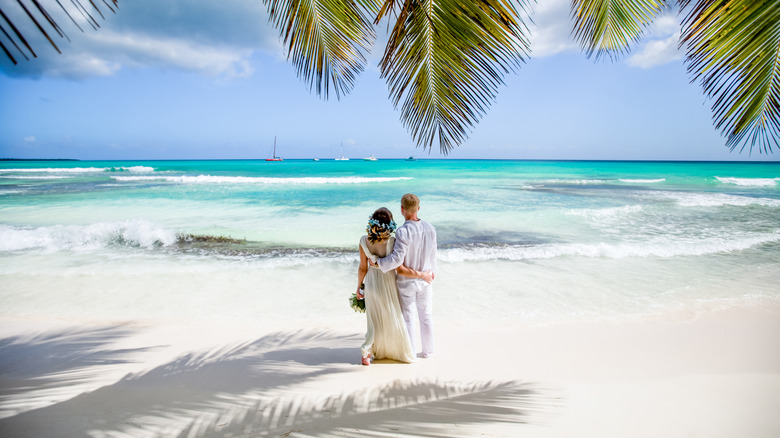Travel Guides Couples Wedding And Honeymoon
Lisa Curran Matte
Most of us are familiar with the old saying about a deal that sounds too good to be true. It probably isn’t. There’s a reason that particular life lesson resonates across a broad spectrum. Ask anyone who’s fallen prey to a too-good-to-be-true scheme and you’ll likely hear a tale of woe followed by a heartfelt pledge to know better going forward. Let’s skip the painful lesson part and cut straight to the chase. This one’s for all the engaged couples out there who are considering booking a free wedding at an all-inclusive resort.
According to The Knot, it all comes down to defining your interpretation of the word “free” and managing your expectations accordingly. A free wedding is a free wedding. It’s not a free honeymoon or a free friends-and-family getaway. It’s not even a free reception. For the most part, an all-inclusive resort’s definition of a free wedding means that, for the price of your all-inclusive booking, the property is throwing in a complimentary wedding ceremony followed by a basic cocktail reception — or maybe a simple dinner — for a very limited number of guests. If you’re expecting anything beyond that, be prepared to pony up some cash for the extras.
Managing expectations

Wuju Planet/Shutterstock
That part about an all-inclusive resort throwing a small wedding ceremony into the deal for the price of a booked stay bears repeating. For the record, free means there’s no additional fee for the ceremony and, maybe, a small reception — but plan on paying the going rate for your all-inclusive room-and-board stay. And if you’re planning to invite guests, make sure they know they’ll also be paying for their stay. Another point worth revisiting: Small means small, including only the most basic matrimonial trappings (via Affordable Weddings Venues & Menus). That kind of simple celebration could be nirvana for couples set on an intimate ceremony in an idyllic setting, but if you’re thinking a free wedding at an all-inclusive resort means paying a fraction of the cost for an elegant extravaganza, you may be in for a rude awakening.
As The Knot points out, all-inclusive resorts are in the business of making money. That means whoever came up with the idea of offering free weddings knew full well it would be a money-making opportunity. Here’s how it works. When you book your wedding, you’ll be assigned a wedding planner. That person, your boots-on-the-ground liaison for everything related to the wedding, is integral to the planning process, but they also work for the resort, not for you. No matter how well-intentioned your planner may be, they will present you with options — flowers, photographer, live music, private space — and each add-on comes at a cost.
Questions and considerations

Prostock-studio/Shutterstock
That’s why it’s important to be realistic and to ask questions. You may envision your wedding day as the pinnacle of romance, but the bells and whistles associated with the celebration are part of an event-planning business partnership with the resort. In other words, don’t get carried away. If you have a do-not-exceed budget, make it clear and stick with it. A buyer’s remorse hangover the day after your wedding is no way to start your honeymoon. But even if you’re steadfast in your commitment to your budget, some extras are simply unavoidable.
For example, you’ll want to know if the wedding officiant contracted by the hotel will be conducting a legal ceremony. It may come as a surprise, but most resort weddings are of the symbolic variety, meaning they’re just for show (via EverAfter Travel). While the ceremonies are almost identical, a symbolic wedding is just that, symbolic. It’s not legally binding in the United States or in the country where it takes place. A legal ceremony at the resort will cost extra. There’s also the marriage license and any other associated fees for required testing or documentation at the destination.
For example, in some parts of Mexico, an American couple planning a legal ceremony must be in the country for at least three days before they can be married (via Mexperience) which means they are paying for three nights’ accommodations prior to the wedding. And don’t forget to factor in travel costs like airfare.
The bottom line

Irina Montero/Shutterstock
And let’s not forget taxes. Breezy Brides booked a $3,500 wedding package at an all-inclusive resort, but the tally jumped to $4,100 with taxes. Still, that’s a major saving over the average cost of an at-home wedding in the United States. According to The Knot 2021 Real Weddings Study, the national average cost of a wedding in 2021 was $28,000. The most expensive place to get married in the United States? Washington, D.C. at an average of $44,000. The cheapest? Idaho and Oklahoma tied at an average of $16,000. Based on a guest list of 105, the average total spend amounted to $266 per guest. That compares to an average cost of $10,000 for a 100-guest destination wedding at a 4.5-star resort in Cancun, according to the Playa del Carmen Blog.
But what about the free wedding? As we said, free doesn’t mean there’s no cash outlay. At the very least, expect to pay the going rate for your accommodations and to meet the minimum requirements that vary by destination. And weigh the pros and cons when it comes to extras like inviting guests. For example, according to Destify, Hyatt Ziva Puerto Vallarta will waive the fee for its basic wedding package if a party of 10 books at least 25 nights total in qualifying room categories.
Bottom line? A free wedding at an all-inclusive resort is free as long as you and the resort agree to the same definition of the word “free.”

